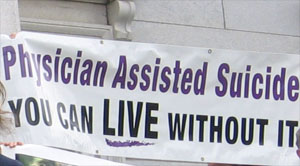
Matters of conscience should not be slipped into government bills: Charles Moore in the Daily Telegraph
Those who advocate assisted suicide (I prefer that term to “assisted dying”, since all decent people want to help others who are approaching death) are having yet another go. This week, in the Lords, probably tomorrow, an attempt will be made to amend the Government’s Health and Care Bill. If passed, the amendment would force the Government to bring forward an Assisted Dying Bill within a year.
This is a strange way of proceeding. There is already an Assisted Dying private members Bill before Parliament. Constitutional convention frowns on trying the same thing twice at the same time. It confuses everything and is unfair to other legislation.
Besides, assisted suicide is, in terms of law, not a health and care issue: its introduction would require a change in the criminal law. By slipping in the word “medical”, the amendment seeks to evade this problem, but it does not solve it. I am sorry that Lord Forsyth, one of the very best performers in the Lords, is pursuing the issue in this way. If he felt differently about the subject, I can imagine him launching a brilliant forensic assault on his own method.
Matters such as assisted suicide are rightly classified as questions of conscience. If they can be slipped into government bills, then no legislation is safe from pressure-group hijack.
Parliamentary guerrilla warfare is a bad way to deal with such a serious subject. I am struck by the letter released to all peers from James Jones, the former Bishop of Liverpool, who led the review of the Hillsborough tragedy. Bishop Jones also chaired the inquiry which investigated the extraordinary unnecessary deaths of 456 patients at Gosport War Memorial Hospital (a criminal investigation is still in progress). He writes that his knowledge of what happened after the Hillsborough disaster and allegedly at the Gosport War Memorial Hospital gives him little confidence that the treatment of vulnerable patients will be benign: “I fear the patronising disposition of unaccountable power in our institutions when treating those who have little power to speak up for themselves.”
So that problem is grave even under the existing law which forbids assisted suicide. Imagine how much worse it could get if the same authorities were allowed to help the almost powerless kill themselves.
================
Baroness Fraser of Craigmaddie
Tuesday January 25 2022, 12.01am, The Times
Having joined the House of Lords during Covid restrictions, I have had a strange introduction. Many of the more established members talk about “getting back to normal”. I have had no experience of “normal”, especially in the context of the House of Lords but I have come to realise the importance members place on parliamentary procedure and that correct parliamentary procedure is followed.
One of the most experienced and respected members of the House is Lord Forsyth of Drumlean, the former cabinet minister, Michael Forsyth. A distinguished parliamentarian, recently elected as chairman of the Association of Conservative Peers, he commands respect from colleagues and opponents alike.
Lord Forsyth’s debating style is warm and engaging but razor-like and to the point. When he rises, the House listens. He is a stickler for proper parliamentary procedure.
It has come as a surprise to me that Lord Forsyth has tabled Amendment 297 to the government’s Health and Care Bill. The Health and Care Bill is a big bill. It will take the Lords at least eight days to go through the 258 pages that came to us from the House of Commons.
The primary purpose of the bill is to reform the delivery and organisation of health services in England so that they become more joined-up and ensure a greater focus on improving health, rather than simply providing health care services.
Many of the clauses in the bill were informed by recommendations made by the NHS, but there are numerous vested interests that are keen to ensure this bill works for them and so the fact that there are over 300 amendments already put down is unsurprising.
Lord Forsyth’s amendment binds government to present a Bill on Assisted Dying to parliament within a year. The amendment acknowledges that the secretary of state must take into account the need to respect this is a matter of conscience. But we already have a Bill before parliament; the one introduced by Baroness Meacher.
The debate on Baroness Meacher’s Bill was one of the most impressive debates I have had the privilege of participating in. Over 130 peers spoke that day and any analysis of what was said illustrates that the House remains deeply divided on this issue. Peers are not alone.
In Scotland, the Orkney MSP, Liam McArthur, recently ran a consultation on a proposed assisted dying bill in Scotland. This is the third attempt to pass such a law. According to McArthur, the response has been “unprecedented”.
He reports a range of views have been expressed, with a number of suggestions. This and the fact that the Meacher Bill has over 200 amendments, illustrate the technical difficulties with drafting legislation on a matter where parliamentarians and public alike remain divided.
I look forward to reading the responses to the Scottish consultation and perhaps to the committee stage of Baroness Meacher’s Bill, but I fervently hope that the Government will not allow themselves to be distracted by Lord Forsyth’s amendment and instead continue to concentrate on improving health in the Health and Care Bill.
I do not doubt Lord Forsyth’s personal commitment to wanting to enable people to end their lives. However, he is not a medical professional who would be asked to participate. Neither is he a disabled person who may rely on others to ensure their daily health and care.
Lord Forsyth is a traditional parliamentarian and I have much to learn from him, but it would set a dangerous precedent if every issue, from environmental to justice, were to shackle the future business of governments.
This attempt to hijack the Health and Care Bill and government business and put it in the hands of a campaign group is an unusual constitutional approach.
Baroness Fraser of Craigmaddie is a Conservative peer and chief executive of Cerebral Palsy Scotland


